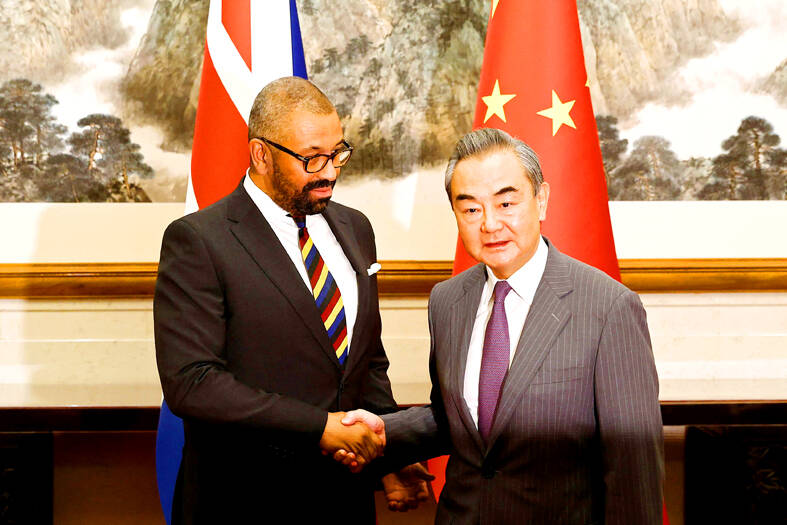The Ministry of Foreign Affairs yesterday thanked the British parliament for showing concern over the increasing threat to regional peace emanating from China after a report by British lawmakers described Taiwan as “an independent country” for the first time.
Taiwan “sincerely welcomes” the concern the British parliament displayed for the situation in the Indo-Pacific region and China’s threats, the ministry said in a news release.
The nation views the UK as a like-minded partner, and is eager to boost bilateral ties in trade and investment, cooperation in the semiconductor industry and information technology, offshore wind power and other areas, it said.

Photo: AFP
Published by the British House of Commons Foreign Affairs Committee concurrently with British Secretary of State for Foreign, Commonwealth and Development Affairs James Cleverly’s visit to Beijing, the report on Britain’s so-called “Indo-Pacific tilt” said that Taiwan “is already an independent country under the name Republic of China.”
“Taiwan possesses all the qualifications for statehood, including a permanent population, a defined territory, government and the capacity to enter into relations with other states — it is only lacking greater international recognition,” the report said.
China poses “a threat to the UK and its interests,” it said. “The behavior of the Chinese Communist Party is currently characterized by increased aggression” to Britain.
The document also criticized British Prime Minister Rishi Sunak’s approach to China saying: “There is confusion in Whitehall about the tilt to the Indo-Pacific, stemming from a failure to explain the policy, and its implications for resource allocation, across government.”
The report urged London to develop “deterrence diplomacy,” increase resilience and defense cooperation with allies, counter Beijing’s threats and protect “the self-determination of the people of Taiwan.”
Cleverly told Bloomberg in an interview that the report was “not a UK government document” and added that London’s stance “has remained consistent that there should be no unilateral change to the status quo.”
“Any changes should be done through discussions on both sides of the Taiwan Strait,” he said.
British Member of Parliament Alicia Kearnes, who is chair of the committee, told Agence France-Presse that “we acknowledge China’s position, but we as [the foreign affairs committee] do not accept it.”
“Strengthening our diplomatic, defensive and economic ties in the Indo-Pacific is critical — if the West leaves a vacuum, China will eagerly fill it,” Kearnes said.
London should announce a policy of “zero tolerance of transnational repression,” including expelling foreign diplomats who intimidate or attack British citizens or those given refuge in the UK, she added.

CHAOS: Iranians took to the streets playing celebratory music after reports of Khamenei’s death on Saturday, while mourners also gathered in Tehran yesterday Iranian Supreme Leader Ayatollah Ali Khamenei was killed in a major attack on Iran launched by Israel and the US, throwing the future of the Islamic republic into doubt and raising the risk of regional instability. Iranian state television and the state-run IRNA news agency announced the 86-year-old’s death early yesterday. US President Donald Trump said it gave Iranians their “greatest chance” to “take back” their country. The announcements came after a joint US and Israeli aerial bombardment that targeted Iranian military and governmental sites. Trump said the “heavy and pinpoint bombing” would continue through the week or as long

TRUST: The KMT said it respected the US’ timing and considerations, and hoped it would continue to honor its commitments to helping Taiwan bolster its defenses and deterrence US President Donald Trump is delaying a multibillion-dollar arms sale to Taiwan to ensure his visit to Beijing is successful, a New York Times report said. The weapons sales package has stalled in the US Department of State, the report said, citing US officials it did not identify. The White House has told agencies not to push forward ahead of Trump’s meeting with Chinese President Xi Jinping (習近平), it said. The two last month held a phone call to discuss trade and geopolitical flashpoints ahead of the summit. Xi raised the Taiwan issue and urged the US to handle arms sales to

BIG SPENDERS: Foreign investors bought the most Taiwan equities since 2005, signaling confidence that an AI boom would continue to benefit chipmakers Taiwan Semiconductor Manufacturing Co’s (TSMC, 台積電) market capitalization swelled to US$2 trillion for the first time following a 4.25 percent rally in its American depositary receipts (ADR) overnight, putting the world’s biggest contract chipmaker sixth on the list of the world’s biggest companies by market capitalization, just behind Amazon.com Inc. The site CompaniesMarketcap.com ranked TSMC ahead of Saudi Aramco and Meta Platforms Inc. The Taiwanese company’s ADRs on Tuesday surged to US$385.75 on the New York Stock Exchange, as strong demand for artificial intelligence (AI) applications led to chip supply constraints and boost revenue growth to record-breaking levels. Each TSMC ADR represents

Pro-democracy media tycoon Jimmy Lai’s (黎智英) fraud conviction and prison sentence were yesterday overturned by a Hong Kong court, in a surprise legal decision that comes soon after Lai was jailed for 20 years on a separate national security charge. Judges Jeremy Poon (潘兆初), Anthea Pang (彭寶琴) and Derek Pang (彭偉昌) said in the judgement that they allowed the appeal from Lai, and another defendant in the case, to proceed, as a lower court judge had “erred.” “The Court of Appeal gave them leave to appeal against their conviction, allowed their appeals, quashed the convictions and set aside the sentences,” the judges